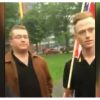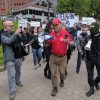When they see us
How they see us
‘Wilding’ (Wilin)
They take our words and depict
Write another script
To fit the picture they paint so ugly and vicious
Criminalizing our image to be suspicious
They put fear in the hearts of the nation
So our homes will become stations
Prisoners
Caged in, raged in, for nothing we engaged in
“Guilty”
Driving while black
Working while black
Walking while black
Talking while black
Just black
Yes that, stirs a different kind of hate
Being black makes white people irate
Nowheres to escape
If you run they got a gun
If you talk they'll tie your tongue
Lies they spit fluidly every word wrapped in cruelty
Years of abuse in systems upon systems we keep saying are broke
If you claim you're so woke
Then you will let go
Of the ideology that the “system works for us”
Instead of against
Young black men that don’t need to jump fence
They just have to exist
This presents a
different childhood for our black kids
Slavery ended over 400 hundred years ago but I still feel these
Shackles on my feet
Slowing me down
The suspects are ‘thugs’
Of course that means brown
When they see us
They see animals
Untamed
And you wonder why they don't know us by name
Because calling us out would make us humane
The injustices of the world make us insane
Mental illnesses from trauma generational and present
Poverty, discrimination, racism so prevalent
No need for evidence
The proof is in our being
Everything they're seeing
Is
Black
Like the pigment of our skin has no depth
Like our blood doesn’t run deep
For our mothers who weep
Over the dead bodies in the streets
Or the ones locked up and ceased
You have faith in the justice of peace
But all I see
Is war
Invisible scars designated in the hearts
Of every black and brown kid
Whose childhood was stolen
But still grew up to be golden
Breaking chains
Reversing pain
Just to heal
Be real
How you see us
Is powerful beyond measure
That’s why you try and stop the levels
We aim to reach, educate and teach
Persistence and passion we’re building
Amongst our brown and black children
So everytime you police a life
We unify with resilience
Because all we ever were was innocent
Kids
It’s not what you see
It’s about who we really are
Your judgement will no longer declare or scar
How I see myself
Or how we see each other
I am his sister, he is my brother

It’s not about when they see you, it’s about when you see yourself, don’t allow other people to cast their fear of you on to you because you’ll grow weary in insecurity, doubt and lack of self esteem in your being. Let the memories of your ancestors be embedded in your mind every time you wake, so you’ll never take yourself for granted.
I wrote this piece for the brown and black children who have to walk everyday in this world under a microscope that wasn’t created to get a better view, to understand, or to be seen, but to be defeated. I know the invisible scars so many of us carry that hold weight. I know the stains on your cheeks are from tears you tried to fight every night before you went to sleep.
I wrote this piece after watching “When They See Us” on Netflix, which was released this May. The mini-series follows the story of the Central Park Five, a group of young brown and black men wrongly convicted of raping a white woman in Central Park, NY.
I thought this documentary was important because of the impact it made in telling the stories of how brown and black lives are policed, especially at a young age. While the rest of society is often “innocent until proven guilty,” brown and black youth are often “guilty by existence.”
All I could think of after watching the series and reading statuses was how relevant that information was to our present lives here in Halifax.
See also: Angela Bowden: Street checks and the trauma stories of our elders and youths
The policing of black lives starts at a very young age in our communities, fear, power, excessive presence, lack of communication or cultural training causes a disconnect. We’re not introduced to police officers in school settings, or after-school programs, or at community BBQ’s. We usually have our first encounter with them in our neighbourhoods that are patrolled daily. We often hear they are here to “protect and serve” but as a black youth it makes you question who are they trying to protect and serve?
I remember being a child and never being allowed to hang in groups outside of school or after-school programs because it would be considered a “gang”. Instantly stripping us of our identity of being children. In grades four and five playing after-school would result in them stopping you to ask what you were up to, instead of asking how you were doing. There was a stereotype that black youth didn’t know how to play or know how to interact with each other without mischief or causing trouble. Imagine What they would’ve found out if they would’ve stopped us to interact and truly get to know us.
This documentary shows the surveillance of brown and black youth, the lack of trust, education, resources, and representation within the justice system as well as the effects of white media. Since I was old enough to read, I enjoyed grabbing newspapers and plucking through them to find interesting stories or to figure out what was happening in my community or the world. It wasn’t until I got a little older that I started to realize the media isn’t a safe space for brown and black people.
Our stories went from not being told, to be written from a context or a perspective that doesn’t represent us or give us equal voice. The amount of success stories within brown and black communities that are untold leave youth feeling unworthy, alienated and voiceless.
White media plays a huge part in the racism and discrimination brown and black youth face because they are often depicted as “thugs”, “suspicious”, “aggressive”, “untamed and animal like”. Which some people may say are just words but words of white media are internalized and embedded in the minds of society to the point when they see brown and black youth on the street it’s hard for them to not be afraid, judgemental, or prejudice.
I can’t explain how many articles I’ve read about brown and black youth that have died and the media thinks it’s important to express their past of run ins with the law no matter how petty or facebook pictures of them as kids in clothing that society depicts as “thuggish” or “gangster”. The lack of empathy in white media towards brown and black families plays a role in dehumanizing our youth and normalizing violence, or death amongst us.
After the documentary was released I read post after post by brown and black people that could relate to things these young men have experienced; from relationships with law enforcement and the deception and unjust practices they often apply to our communities, over-patrolling and aggressively approaching and arresting our youth without cause. The lack of education about the Justice system amongst our communities and the fact that we don’t know our real rights. The impact of high incarceration rates amongst our communities from mental illness to lack of supports and resources. The amount of wrongly convicted or harsh sentencing for petty crimes and the list really could go on.
Something that I really took away was the amount of white people that watched and were just as upset, and able to gain a new perspective. What wasn’t shocking was the amount of white people in denial that a justice system that was designed to criminalize brown and black marginalized people, would participate in such wrong actions.
I think the more shocking posts were the ones of people that don’t believe this kind of behaviour could exist in Halifax, or even Canada for that matter. One of the main reasons I wrote this article was to spread awareness about the policing of brown and black lives specifically in Canada, because it does exist and always has.
Guyleigh Johnson’s latest book, Afraid of the Dark, is published by Pottersfield Press. In 2016 Guyleigh published Expect the unexpected – Voices from the North End, her first collection of spoken word poetry, also by Pottersfield Press. Both books can be found in a bookstore near you.
With a special thanks to our generous donors who make publication of the Nova Scotia Advocate possible.
Subscribe to the Nova Scotia Advocate weekly digest and never miss an article again. It’s free!



